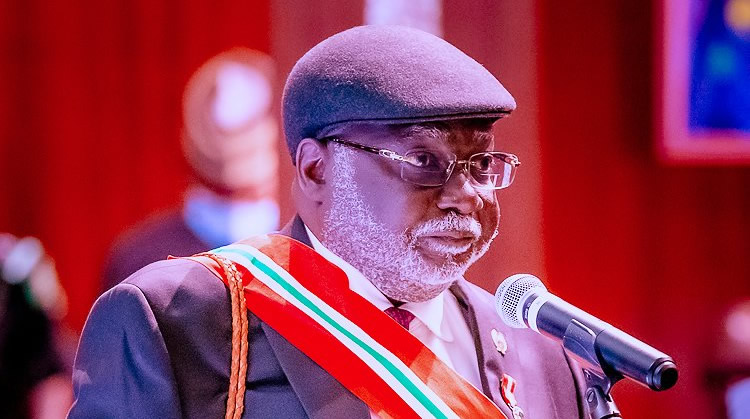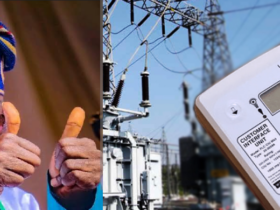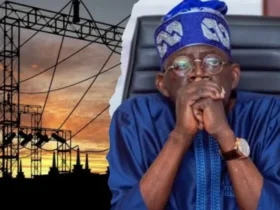
tThe Chief Justice of Nigeria, Olukayode Ariwoola, has named his younger brother, Adebayo Ariwoola, as the newly appointed auditor for the National Judicial Council (NJC), according to information obtained by Peoples Gazette last week.
Adebayo Ariwoola’s new role places him in a significant position overseeing the internal audit unit of the NJC, granting him substantial authority to ensure financial integrity and responsibility within the commission.
His responsibilities include evaluating internal controls, scrutinizing accounting processes, and ensuring compliance with legal standards.
The appointment is noteworthy as it establishes a direct family link between Justice Ariwoola, a figure of supreme authority within the judiciary, and the head of a crucial oversight unit.
“It is about transparency here,” Chido Onumah, an anti-corruption campaigner, said. “There is no chance that the auditor will do anything to the detriment of his older brother, and there lies the fundamental issue with the appointment.”
Mr. Onumah, the coordinator of the African Centre for Media and Information Literacy (AFRICMIL), emphasized the significance of this perception, stating that the chief justice should typically be cognizant of it.
“Even if the brother were qualified to be the auditor, it is part of the sacrifices that they must collectively make for the sanctity of the chief justice’s office, for being in leadership position,” said Mr. Onumah.
He added, “If the brother were appearing before him in a case, his opponent could validly ask Justice Ariwoola to recuse himself from the matter, and the same logic just follows that two members of the same family cannot be watching over each other in a government institution.”
READ ALSO: “No Mob Can Intimidate, Overwhelm Us” CJN Says Amid Knocks On Judiciary
As reported by Peoples Gazatte, before his elevation to the highest position, Mr. Ariwoola served as an accountant at the NJC.
Public affairs analyst Lanre Suraj suggests that this promotion deserves the benefit of the doubt.
“We should be fair to assume that the NJC will not skip critical hierarchies to appoint the brother of the CJN as auditor,” he said. “Every civil servant has the right to aspire to senior positions within their sphere.”
However, Mr. Suraj acknowledges the intricacy of the situation, expressing that both the Chief Justice of Nigeria (CJN) and the National Judicial Council (NJC) should exhibit greater consideration for the evident conflict of interest.
Whoever will assume the office of an auditor should be “impartial” and “upright,” “having a level of independence,” Mr Suraj said. “Public expectation and assumption will not favour them (the CJN and his brother) in that consideration.”
“For me, I think it will be more than important for the CJN and the NJC to find a way around it without putting both the office of the CJN and that of the auditor in that moral complications and burden before the public,” he added.
This development aligns with a turbulent phase in the relationship between the judiciary and the public. The judiciary’s recent series of crucial rulings on matters central to the country’s democracy has been characterized by a dismissive attitude towards public opinion.
Prominent jurists have adopted a defensive stance, deflecting public sentiment despite a growing skepticism surrounding the judiciary’s overall reputation.
Observers note that Justice Ariwoola’s recent statements asserting that public opinion does not influence judicial responsibilities seem to reflect a broader trend within the judiciary. Ariwoola stance, supposedly rooted in legal principles, ignores a fundamental reality: many protests against court rulings arise from the perceived prioritization of technicalities over justice and legal fairness.
This sentiment was evident in September when members of the appellate court panel overseeing the presidential election petition tribunal publicly disregarded impassioned calls for justice from the public, dismissing them as orchestrated tactics by opposing political parties seeking to challenge election results and intimidate the judiciary.
Juwon Sanyaolu, director of the Take-it-Back Movement in Nigeria, expresses concern over what he describes as a lack of attention from almost every government arm to how people perceive the institutions they oversee.
Mr. Sanyaolu highlights a troubling trend, noting a minimal consideration for public opinion and perception in various government branches.
“We are witnessing a system of ‘anything goes’ under the ruling All Progressives Congress where senior public officials have no regard for what is publicly tenable,” he said. “I think it is condemnable and improper.”
READ ALSO: Stop Tarnishing Judiciary’s Image, CJN Urges Judges
Mr. Sanyaolu emphasizes that the possibility of compromising the integrity of the auditor’s office is not just hypothetical but a real threat based on visible assumptions.
“We have seen the corruption of due process and public institutions on many fronts. There have been repeated internal disagreements within the judiciary itself about the disbursement of the funds it receives, so the fact that the auditor could easily become his brother’s accomplice should there be an infringement or abuse of power if not far-fetched,” he added.
It is not uncommon for judiciary members to question the financial planning and expenditures overseen by Ariwoola and other directors within the institution. Past complaints have been raised through strongly-worded memos seeking executive intervention to address deteriorating working conditions for senior judges despite the financial allocations received.
In 2020, 13 Supreme Court justices called out the chief justice based on deteriorating work conditions. One of the justices, Musa Dattijo Mohammed, who signed the petition, asserted in his retirement speech later in 2023 that the over N160 billion the federal judiciary received in the allocation has not translated into improved working conditions for the judges.
“Despite the phenomenal increases in the sums appropriated and released to the judiciary, Justices and officers’ welfare and the quality of service the judiciary render have continued to decline. It is instructive to inquire what the judiciary also does with its allocations. Who is responsible for the expenditure? An unrelenting searchlight needs to be beamed to unravel how the sums are expended,” he said. #Ariwoola







Leave a Reply